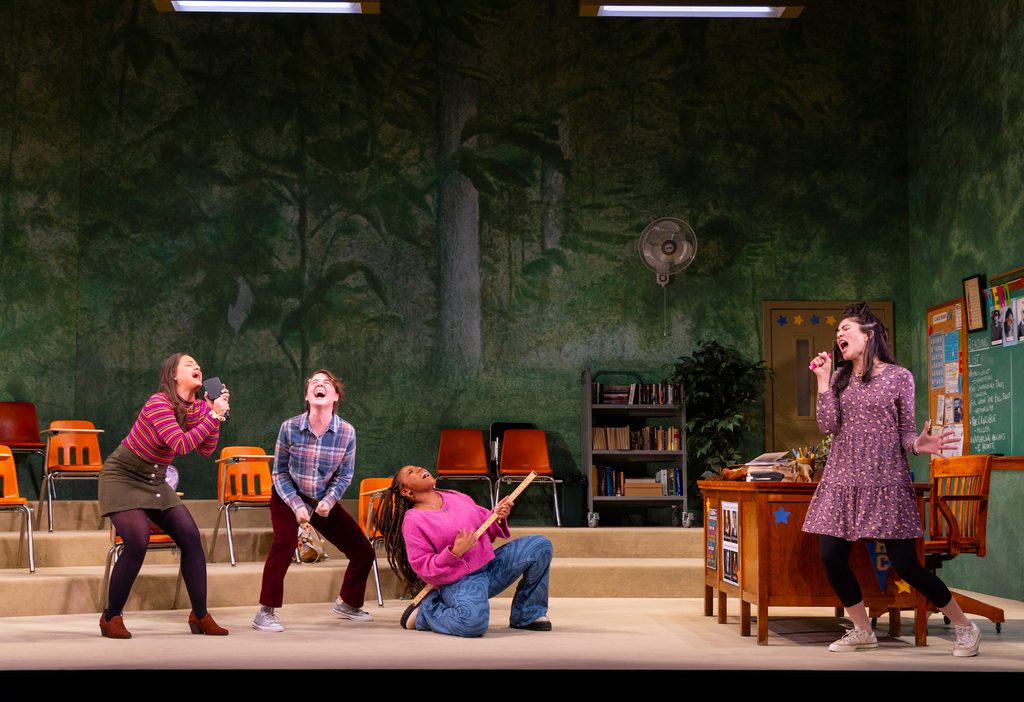
‘John Proctor Is the Villain’ — Written by Kimberly Belflower. Directed by Margot Bordelon. Scenic Design by Kristen Robinson; Costume Design by Zöe Sundra; Lighting Design by Aja M. Jackson; Sound Design by Sinan Reflik Zafar. Presented by The Huntington at Performing at the Calderwood Pavilion at the BCA, 527 Tremont Street, Boston, through March 10, 2024.
By Shelley A. Sackett
In 1692, a witchcraft panic in Salem, Massachusetts, led to the conviction and execution of 19 innocent people (14 women and five men) for a crime that not only was never committed but that never happened in the first place.
A mixture of irrational fear, unchecked religious and patriarchal power, and a persecuting mentality led to the emergence of witch hunts and subsequent witch trials.
Arthur Miller fictionalized and immortalized this historical event in 1953 with The Crucible, a mainstay of most high school English Literature curricula. He intended it as an allegory for and indictment of the rabid McCarthyism of the 1950s, when the U. S. government blithely persecuted citizens accused of being communists based, often, on nothing more than innuendo and hearsay.
Fast forward to 2018 and an 11th-grade honors English literature class in rural Georgia, the time and place where “John Proctor Is the Villain,” Kimberly Belflower’s razor-sharp and timely play, is set. The opening scene finds Carter Smith (played by Japhet Balaban), the laid-back, I-could-be-your-buddy teacher, standing in front of a group of bored teenagers, each with their textbook open.
“Sex,” he says. In unison, the students robotically recite the administration and school board approved definition.
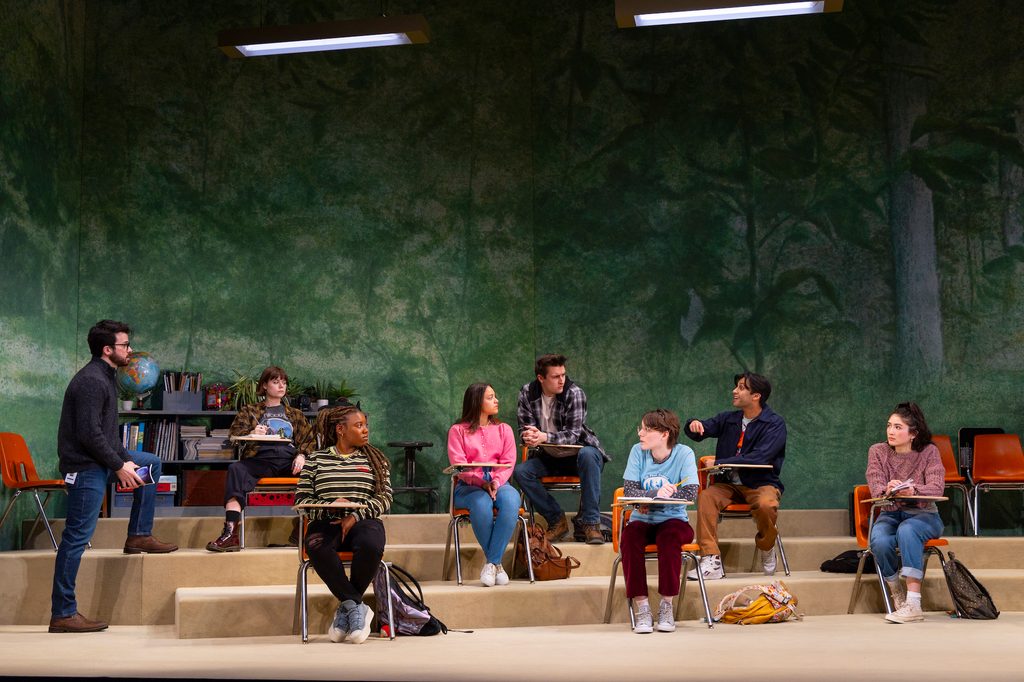
We get an inkling of the seven students’ (five girls and two boys) personalities and styles through the intimate banter that ensues. Beth (Jules Talbot), an eager, smart student, complains about squandering lit time for the ten minutes of sex education that the curriculum demands of each class.
Nell (Victoria Omoregie), a new transplant from Atlanta, says she had sex ed in fifth grade. Ivy (Brianna Martinez) is all business and practicality (“Doesn’t it make sense for sex ed to actually come like before people know about sex?”). Raelynn (Haley Wong) is a cheerleader type, scowling one minute and vamping the next. Lee (Benjamin Izaak) is the quintessential poster boy for teenage testosterone, and Mason (Maanav Aryan Goyal) is the class loafer.
We also get a glimpse of Carter and the adoration he culls and basks in. “I know it seems really lame, guys. Believe me, I remember being exactly where you are and feeling like, ‘Are you kidding me?’ but this is the curriculum. These are the facts.”
He is the teacher we all wanted to have in high school — smart, a little goofy, and universally appealing. He culls his students’ trust.
He also has a laundry list of issues, including ones respecting boundaries. Caught in the netherworld between being a teenager himself and entering the adult world of his student’s parents, he evokes both our affection and suspicion.
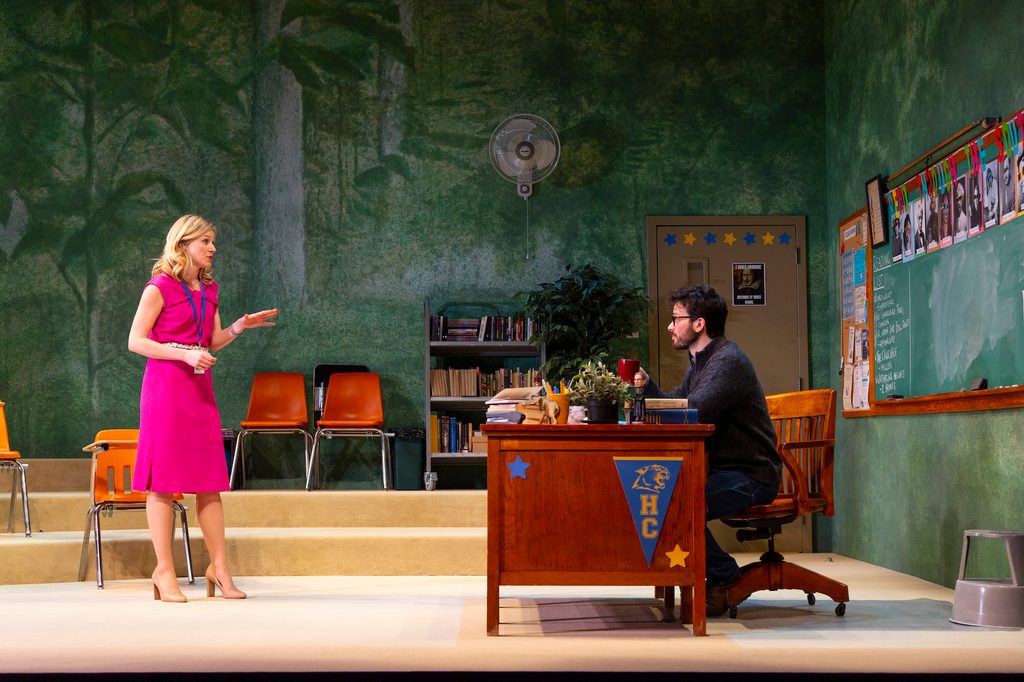
Following several more excruciatingly boring call-and-response sex ed definitions, Carter explains that the class’s next assignment will be to read and critique “The Crucible.” He teaches it in a fairly traditional way and proclaims John Proctor as the hero of the play.
Proctor, as a reminder for those who don’t remember the details of The Crucible, is the 35-year-old married man who has an affair with Abigail, a teenage girl in his employ. To save his honor, he lies about the affair up until the moment he is about to be hanged and only confesses because he thinks it will literally save his own neck.
Carter deems Abigail, who is disgraced and fired from her job, as the play’s true villainess because she starts the witch hunt that leads to the Salem Witch Trials. “Abigail is like really determined to get revenge. She becomes kind of a ringleader to everyone making these accusations and it gets pre-tty crazy,” Carter explains.
His five #MeToo generation female students don’t quite see it that way. After all, Proctor committed adultery with a teenager, lied about it, and let her take the blame for the affair. They maintain that Abigail’s acts of “revenge” — accusing citizens of consorting with the devil — was the only way for her to achieve empowerment in a theocratic, Puritanical patriarchal society that marginalized and demonized her.
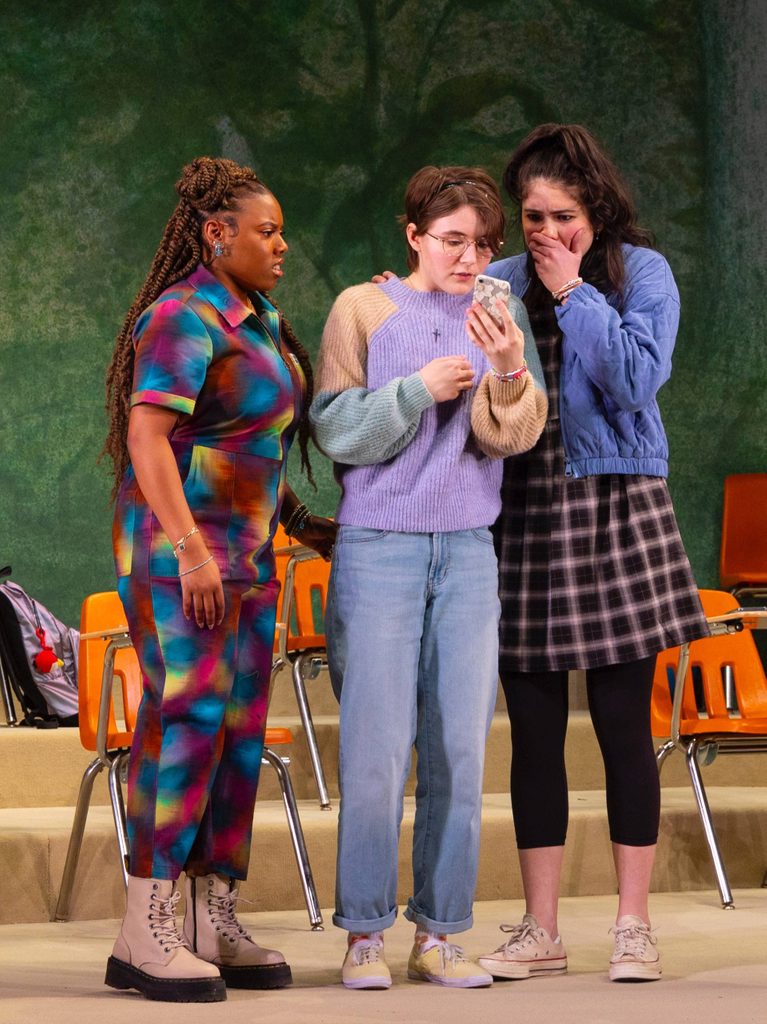
Shelby (Isabel Van Natta), who has returned to school after an unexplained absence, is particularly incensed. Where is the goodness, she asks, in a man who seduces a teenage girl and then throws her out when his wife finds out? A man who only had to lie to be able to put the whole mess behind him?
Adding to the caldron of budding feminism these five students are stirring is the fact that their request to start a Feminist Club (to “spread awareness, foster dialogue, and ignite change”) has been rejected by the school board. Their guidance counselor, Miss Gallagher (Olivia Hebert), delivers the bad news. When Carter steps up and offers to be its faculty advisor so it can go forward, the pieces are all in place for playwright Belflower to conjure her dramaturgical magic.
And make no mistake. Bridging eras of 17th-century Calvinist Puritanism, 20th-century McCarthyism, and the 21st-century #MeToo movement to create a cogent, insightful, accessible, and – most of all – funny commentary on the issues of male power and female vulnerability and agency is nothing short of miraculous.
The plot of John Proctor Is the Villain is so integral to its message and enjoyment that it would be a spoiler to detail what happens next in this theatrical gem. Suffice it to say that there are enough surprises, twists, and turns to make 100 intermission-less minutes fly by and a climactic finale that is guaranteed to leave you clapping furiously during a standing ovation.
Director Margot Bordelon squeezes every drop of theatrical juice out of this fast-paced, fabulous, must-see play. Under its comic overtones lie deep issues such as female friendship, gender dynamics, speaking truth to power, and patriarchal autocracy. Kudos to Bordelon for aiming equal beams on the light and dark elements of the play’s messages.
To be fair, Bordelon has a lot to work with. Belflower has an uncanny ear for dialogue, and she has penned spectacular characters. Her teenagers are articulate and insightful. They are also silly, petty, and childish. In short, they are believable adolescents, and the cast wears their roles as if they were made to order.
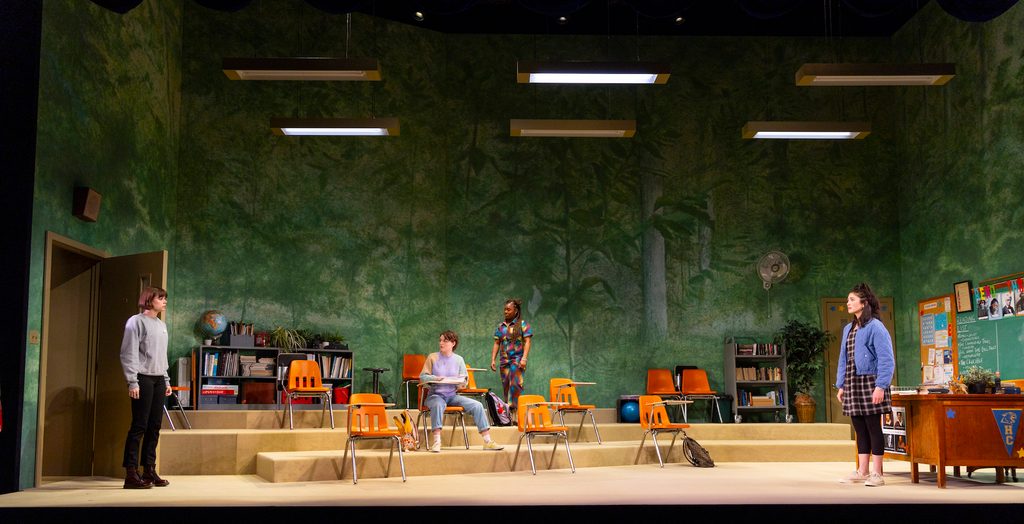
Carter, as the John Proctor stand-in, is appropriately smarmy and endearing. He is like jello. He presents as solid but, in truth, is an eely mass of spineless gelatin, and Balaban taps into this duplicity with subtlety and self-assurance.
John Proctor Is the Villain is what good theater is all about. Its storyline is a dynamo of action and intrigue, of pathos and laugh-out-loud humor. Engaging and thought-provoking, its message is one that rings loud and true today. As Carter explains in his introductory lesson on The Crucible, “Later we found out that all those accusations were untrue. Innocent people died, and why? Largely mass hysteria, spurred on by … a bunch of people saying untrue things that could become dangerous if left unchecked.”
Highly recommended.
For tickets and information, go to https://www.huntingtontheatre.org/

